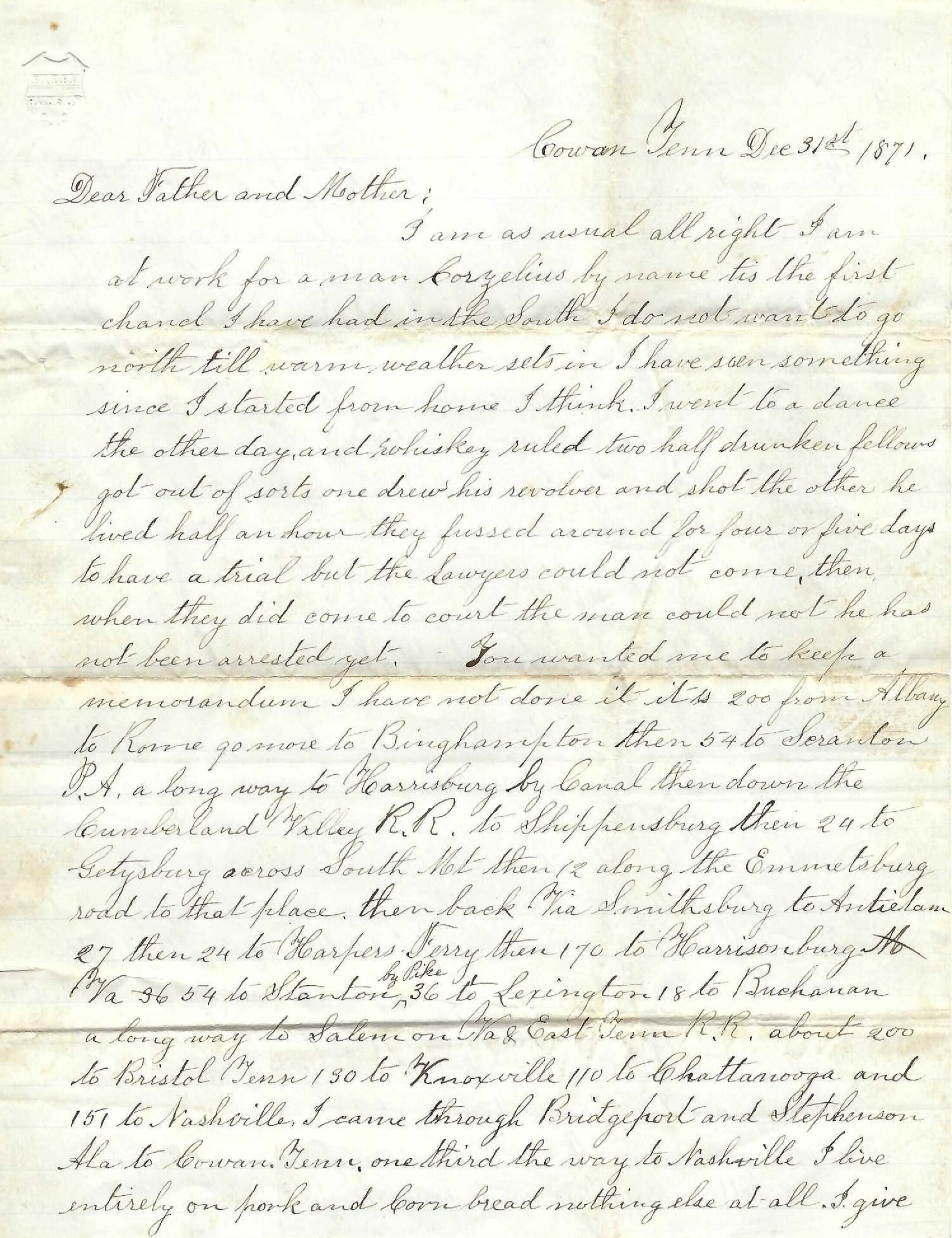
Take a trip down South during Reconstruction with Natick resident Albert L. Smith.
Albert L. Smith Visits the South: 1871-1872
Among the Natick Historical Society’s collections are two letters from Albert L. Smith that he sent to his family in Natick while traveling around Appalachia after the Civil War. Albert’s letters vividly depict a single man’s journey in the South.
A Union Army cap, like that Albert and his brothers would have worn while serving (Shirley Brown Collection, NHS)
The Smith Family and Civil War Service
The Smith family moved to Natick from Kennebec County, Maine, around 1854. Charles and his wife Betsy settled in Natick with their nine children: Charles Jr., George, Emma, Ann, Albert, Milton, Levander, Albion, and Elesg. By the war's end in 1865, only Albert, Milton, Levander, and Albion remained home with their parents. The two eldest sons, Charles and George, both joined the Union Army in 1861 at the onset of the war, and both died in uniform. Charles went missing in July 1863 during the Battle of Gettysburg and was reported dead in 1864 at a prisoner-of-war camp in North Carolina. George died in 1863 while serving on the USS Potomac in Pensacola, Florida.
Albert enlisted in the Union Army at 17 in July of 1863, five days after his brother Charles was first reported missing. He was mustered two weeks later (July 28th) into Company A of the Second Regiment of the Massachusetts Volunteer Heavy Artillery. Albert was discharged on September 3rd of the same year, however, after it was revealed he was too young to serve: at the time, the Union Army had an age requirement of 18 years. Upon returning home, Albert went to work as a shoemaker with his family in Natick, which is why he did not return to the Army once he turned 18.
Albert’s younger brother, Milton, enlisted when he turned 18 in 1864 and served until the war's end in the Massachusetts 61st Regiment. After the war, Milton returned to Natick to live and work as a shoemaker.
Follow Albert down south
There are two letters from Albert to his family in Natick in the NHS collections (one from December 31st, 1871/January 1st, 1872, and one from May 19, 1872). In these letters, Albert detailed the various places he visited on his trip south. Beginning in Natick, Albert headed west to upstate New York and then south along the railroad through Pennsylvania, Maryland, and the Virginias. He headed further southwest to Kentucky and Tennessee, where he would stay for months and write these two letters.
In his letters, Albert wrote of the smallpox outbreak in Philadelphia,
“The old Harry** was to pay all through the state on account of the small pox which raged fearfully in Philadelphia and spread all around. Some had died in Carlisle just before I got there. I was questioned closely about it wherever I went but I did not tell them much: it would only frighten them more.” [Jan. 1, 1872 letter]
The resentment for the North among Southerners he had met,
“I wish I had my coat. I have got a blue army coat but that is not very fascinating here. I got it at Gettysburg too which don’t mend the matter. They would change the color of the sky if they could. They used to honor the name of Yankee, now they utterly detest it.” [Jan. 1, 1872 letter]
how impressed he was with Kentucky soil and farmland,
“Kentucky is the best state I have seen yet for farming and for mills. Heavily timbered and well watered, but machinery cannot be used advantageously being very uneven. Otherwise K. is a good farming country: the soil is exceedingly fertile, climate salubrious.” [May 19, 1872 letter]
and even a murder he had witnessed!
“I have seen something since I started from home I think. I went to a dance the other day, and whiskey ruled two half drunken fellows got out of sorts one drew his revolver and shot the other. He lived half an hour. They fussed around for four or five days to have a trial but the lawyers could not come, then, when they did come to court the man could not. He has not been arrested yet.” [December 31st, 1871 letter]
Questions for Home
Albert also inquired about the latest news in Natick, including if there had been any more fires in Natick since the particularly destructive fire in South Natick on March 2nd, 1872 (evidently, Albert had heard about this in letters from back home). He asked about his younger brothers and asked someone to look after his machinery while he was away. By 1873, Albert was back in Natick, now renting a place downtown while continuing his work as a shoemaker.
By: Rachel Speyer Besancon
** “Old Harry” was sometimes used colloquially in reference to the devil. “The old Harry” means “the devil.”
return to 19th century menu:
click here
Selected Sources:
1855 and 1865 Massachusetts State Census for Natick, Compiled by Ann S. Lainhart, (1986).
Archives of the Commonwealth, Massachusetts Soldiers, Sailors, and Marines in the Civil War, (1931).
Ellis, Tom A. C., Jr., Natick’s Civil War Service Book: A History and Roster, (2015).
Ridley, Joseph, Ridley’s Directory of Natick, (1873).

